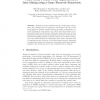Free Online Productivity Tools
i2Speak
i2Symbol
i2OCR
iTex2Img
iWeb2Print
iWeb2Shot
i2Type
iPdf2Split
iPdf2Merge
i2Bopomofo
i2Arabic
i2Style
i2Image
i2PDF
iLatex2Rtf
Sci2ools
155
click to vote
PKDD
2007
Springer
2007
Springer
Multi-party, Privacy-Preserving Distributed Data Mining Using a Game Theoretic Framework
Abstract. Analysis of privacy-sensitive data in a multi-party environment often assumes that the parties are well-behaved and they abide by the protocols. Parties compute whatever is needed, communicate correctly following the rules, and do not collude with other parties for exposing third party’s sensitive data. This paper argues that most of these assumptions fall apart in real-life applications of privacy-preserving distributed data mining (PPDM). This paper offers a more realistic formulation of the PPDM problem as a multi-party game where each party tries to maximize its own objectives. It develops a game-theoretic framework to analyze the behavior of each party in such games and presents detailed analysis of the well known secure sum computation as an example.
Multi-party Environment | Party’s Sensitive Data | PKDD 2007 | Privacy-preserving Distributed Data |
Related Content
| Added | 09 Jun 2010 |
| Updated | 09 Jun 2010 |
| Type | Conference |
| Year | 2007 |
| Where | PKDD |
| Authors | Hillol Kargupta, Kamalika Das, Kun Liu |
Comments (0)

